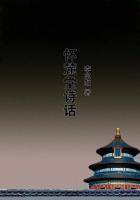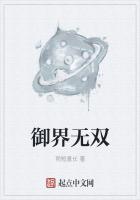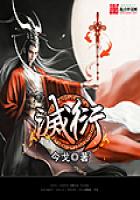"Were you on the field all the time, father?"
"I was near Houston from first to last. When he saw the battle was won, he did his best to prevent needless slaughter.
But men on a battle-field like San Jacinto cannot be reasoned with; after a certain point, they could not even be commanded.
The majority had some private revenge to satisfy after the public welfare had been served. We met one old man in a frenzy, covered with blood from his white beard to his boots, his arms bare to his shoulders, his knife dripping from haft to point."
"Houston looked at him, and said something about mercy and valor. `General,' he said, `they killed two of my boys at Goliad, and my brother at the Alamo. I'll not spare a Mexican while I've the strength to kill one. I'm on the scent for Santa Anna, and, by G--, if I find him, I will spare Texas and you any more trouble with the brute.'"
At this moment Thomas Worth entered the marquee, and, in an excited manner, said:
"Santa Anna is taken! Santa Anna is taken! "
"Taken!" cried the Senora in a passion.
"Taken! Is it possible the wretch is yet in this world? I was assuring myself that he was in one not so comfortable.
Why is he not killed? It is an inconceivable insult to humanity to let him live. Have you thought of your brother Juan? Give me the knife in your belt, Thomas, if you cannot use it."
"My dear mother--"
"Maria, my life! Thomas could not wisely kill so important a prisoner. Texas wants him to secure her peace and independence. The lives of all the Americans in Mexico may depend upon his. Mere personal vengeance on him would be too dear a satisfaction. On the battle-field he might have been lawfully slain--and he was well looked for; but now, No."
"Holy Mary! might have been slain! He ought to have been slain, a thousand times over."
"Luis, I wish that you had been a hero, and killed him. Then all our life long, if you had said, `Isabel, I slew Santa Anna,' I should have given you honor for it. I should be obedient to your wishes for that deed."
"But my charming one, I prefer to be obedient to your wish.
Let us not think of the creature; he is but a dead dog."
The doctor turned to his son. "Thomas, tell us about the capture."
"I was riding with a young lieutenant, called Sylvester, from Cincinnati, and he saw a man hiding in the grass. He was in coarsest clothing, but Sylvester noticed under it linen of fine cambric. He said: `You are an officer, I perceive, sir.' The man denied it, but when he could not escape, he asked to be taken to General Houston. Sylvester tied him to his bridle-rein, and we soon learned the truth; for as we passed the Mexican prisoners they lifted their hats and said, with a murmur of amazement, `El Presidente!'
"The news spread like wildfire. As we took him through the camp he trembled at the looks and words that assailed him, and prayed us continually, `for the love of God and the saints,' not to let him be slain. We took him to Houston in safety.
Houston was resting on the ground, having had, as my father knows, a night of great suffering. Santa Anna approached him, and, laying his hand on his heart, said: `I am General Antonio Lopez de Santa Anna, President of the Mexican Republic, and I claim to be your prisoner of war.' Houston pointed to a seat, and then sent for Santa Anna's secretary, Almonte, who is also a prisoner, and who speaks English perfectly.'
"When Almonte came, he embraced Santa Anna, and addressing Houston, said: `General, you are born to a great destiny.
You have conquered the Napoleon of the West. Generosity becomes the brave and the fortunate.'
"Houston answered, sternly: `You should have remembered that sentiment at the Alamo and at Goliad.'
"Then the following conversation occurred. Santa Anna said:
"`The Alamo was taken by storm. The usages of war permitted the slaughter.'
"`We live in the nineteenth century, President. We profess to be Christians.'
"`I have to remind you, General Houston, of the storming of San Sebastian, Ciudad, Riego and Badajos, by the Duke of Wellington.'
"`That was in Spain. There may have been circumstances demanding such cruelty.'
"`Permit me also to bring to your intelligence the battles at Fort Meigs and at the river Raisin. American prisoners were there given by English officers to their Indian allies for torture and death. The English war cry at Sandusky was, "Give the d-- Yankees no quarter."'















